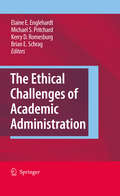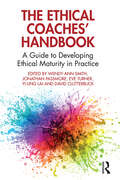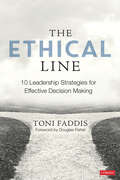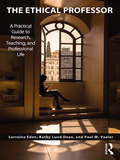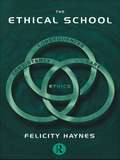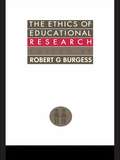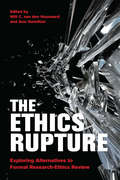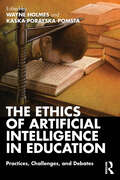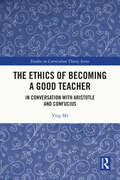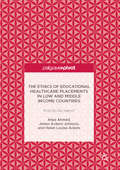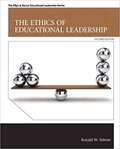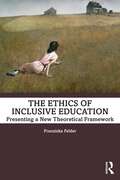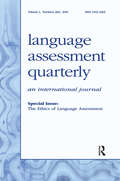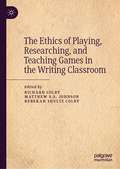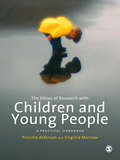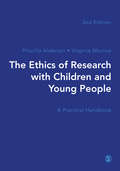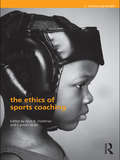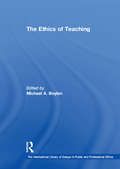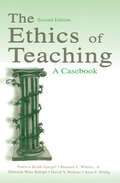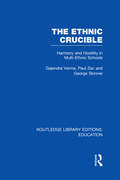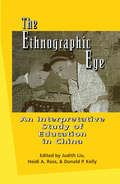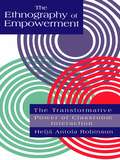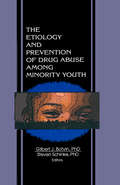- Table View
- List View
The Ethical Challenges of Academic Administration
by Michael S. Pritchard Elaine E. Englehardt Kerry D. Romesburg Brian SchragThis book is an invitation to academic administrators, at every level, to engage in reflection on the ethical dimensions of their working lives. Academics are very good at reflecting on the ethical issues in other professions but not so interested in reflecting on those in their own, including those faced by faculty and administrators. Yet it is a topic of great importance. Academic institutions are value-driven; hence virtually every decision made by an academic administrator has an ethical component with implications for students, faculty, the institution, and the broader community. Despite this, they receive little systematic preparation for this aspect of their professional lives when they take up administrative posts, especially when compared to, say, medical or legal training. Surprisingly little has been written about the ethical challenges that academic administrators are likely to face. Most of the literature relating to academic administration focuses on "leadership" and draws heavily on management and social science theory. The importance of focusing on ethical deliberation and decision-making often goes unrecognized.
The Ethical Coaches’ Handbook: A Guide to Developing Ethical Maturity in Practice
by Jonathan Passmore David Clutterbuck Eve Turner Wendy-Ann Smith Yi-Ling LaiWhat does it mean to be ethical as a coach? Just how ethical are you? How does ethics influence your coaching and how do you know if you are engaging in ethical practice? This important and eye-opening volume provides critical insight from the thought leaders in coaching across a full range of ethical issues. Presented in four parts, this new handbook works to guide the reader towards ethical maturity to strengthen their practice, though examination of theory and thought provoking practice examples. Part 1, Foundations of Ethics in Coaching, provides a detailed overview of the basic principles of ethical coaching. Part 2, Ethics in Coaching Practice, details specific examples of where you will need to think ethically and be guided by good ethics within your practice. Part 3, Pushing the Boundaries of Ethical Thinking in Coaching, dives deeper into topics such as race, managing mental health, the environment and marketing. Part 4 consists of twelve case studies which encourage you to think about putting the theory of the book into practice. The Ethical Coaches’ Handbook will provide ideal support to students, practitioners and coach educators looking to deepen, broaden and enhance their ethical coaching practice.
The Ethical Line: 10 Leadership Strategies for Effective Decision Making
by Toni Osborn FaddisBe the leader your school community needs The responsibilities of school leaders are increasingly complex. In this book, you will find a problem-solving model to help you think through morally complex situations. These steps will enable you to arrive at innovative solutions that are ethical, logical, culturally sensitive, and in the best interests of students. Packed with real-life vignettes, mental exercises, reflections, checklists, and other templates, these strategies will help you Understand how ethical standards and core values drive your leadership choices Approach problems through a lens of equity and care for the students entrusted to you Recognize when urgent action is called for and when it’s better to slow down in order to thoroughly consider your actions and the potential consequences of those actions As a leader, you face difficult challenges every day. This book will help ensure that the decisions you make are right for your students—and for the whole community.
The Ethical Line: 10 Leadership Strategies for Effective Decision Making
by Toni Osborn FaddisBe the leader your school community needs The responsibilities of school leaders are increasingly complex. In this book, you will find a problem-solving model to help you think through morally complex situations. These steps will enable you to arrive at innovative solutions that are ethical, logical, culturally sensitive, and in the best interests of students. Packed with real-life vignettes, mental exercises, reflections, checklists, and other templates, these strategies will help you Understand how ethical standards and core values drive your leadership choices Approach problems through a lens of equity and care for the students entrusted to you Recognize when urgent action is called for and when it’s better to slow down in order to thoroughly consider your actions and the potential consequences of those actions As a leader, you face difficult challenges every day. This book will help ensure that the decisions you make are right for your students—and for the whole community.
The Ethical Professor: A Practical Guide to Research, Teaching and Professional Life
by Lorraine Eden Kathy Lund Dean Paul M VaalerThe purpose of The Ethical Professor is to provide a road map to some of the ethical dilemmas that doctoral students and newer faculty members are likely to face as they enter a career in academia (the Academy). Academic career paths appear to be quite standard, transparent, and achievable with dedicated and hard work. Argued in this book, however, is that the road map to a successful academic career is not so easy. There are ethical pitfalls along the way, starting with entry into academia as a new PhD student. These ethical dilemmas remain equally opaque as faculty progress in their careers. The ethical pitfalls that plague each of the steps along the academic career path are often not visible to doctoral students and young faculty members; nor are they well prepared to spot them. Ethical issues are seldom discussed and little training is provided on how to spot and handle these potential road blocks to a successful career in the academy. Based on extant research and collective years of academic experience, The Ethical Professor seeks to shorten the learning curve around common ethical pitfalls and issues by defining them, sharing research and experiences about them, and offering a discussion framework for continued learning and reflection. This innovative new volume will be key reading for doctoral students and junior faculty members in social science departments in colleges and universities, as well as managers undertaking an MBA. Due to the increasing complexity of managing academic institutions, more seasoned professors, administrators, and college deans and presidents, will also benefit from the research presented here.
The Ethical School: Consequences, Consistency and Caring
by Felicity HaynesConflicts often arise between regulations, making it difficult for school management teams and teachers to resolve situations with appropriate dignity and respect for all concerned. This book discusses provocative actual case studies to help teachers to reflect on their own ethics, guiding them to make more reasonable decisions in their schools, and thereby gradually transforming schools into more cohesive and caring communities. A model of consequences, consistency and caring, each aspect based on traditional ethical theories provides a scientific base - a rational and a responsive base for ethical decision-making. This work covers such everyday problems as censorship, inclusivity, school uniform, punishment, personal gain and confidentiality, and argues that care and respect for others, equity, rational autonomy and concern for long-term benefits are more important for a school community than short-term power and control.
The Ethics Of Educational Research (Social Research And Educational Studies #Vol. 8)
by Robert G. BurgessThis collection of papers examines ethical issues in different kinds of social research including surveys, ethnography and historical research. Contributors also deal with ethical problems involved in examining controversial issues in education. Hence the book is largely about the ethics of the conduct of social investigation, rather than an analysis of the technical procedures themselves.
The Ethics Rupture: Exploring Alternatives to Formal Research-Ethics Review
by Ann Hamilton Will C. van den HoonaardFor decades now, researchers in the social sciences and humanities have been expressing a deep dissatisfaction with the process of research-ethics review in academia. Continuing the ongoing critique of ethics review begun in Will C. van den Hoonaard's Walking the Tightrope and The Seduction of Ethics, The Ethics Rupture offers both an account of the system's failings and a series of proposals on how to ensure that social research is ethical, rather than merely compliant with institutional requirements.Containing twenty-five essays written by leading experts from around the world in various disciplines, The Ethics Rupture is a landmark study of the problems caused by our current research-ethics system and the ways in which scholars are seeking solutions.
The Ethics of Artificial Intelligence in Education: Practices, Challenges, and Debates
by Wayne HolmesThe Ethics of Artificial Intelligence in Education identifies and confronts key ethical issues generated over years of AI research, development, and deployment in learning contexts. Adaptive, automated, and data-driven education systems are increasingly being implemented in universities, schools, and corporate training worldwide, but the ethical consequences of engaging with these technologies remain unexplored. Featuring expert perspectives from inside and outside the AIED scholarly community, this book provides AI researchers, learning scientists, educational technologists, and others with questions, frameworks, guidelines, policies, and regulations to ensure the positive impact of artificial intelligence in learning.
The Ethics of Becoming a Good Teacher: In Conversation with Aristotle and Confucius (Studies in Curriculum Theory Series)
by Ying MaThis book explores Aristotelian and Confucian wisdom traditions to understand education and what counts as a good teacher in an embodied dialogic approach. The book creates a dialogue between ancient ideas and the author’s lived experiences as a teacher in cross-cultural landscapes today to ruminate on the important themes of educational purpose, teacher excellence, teacher-student relationships, and teaching skill. It asks fundamental educational questions including "Why Do We Educate? Eudaimonia and Dao"; "What Do We Educate? Phronesis, Philia and Ren"; and "How Do We Educate? Techne and Liuyi". Moving beyond the dominant epistemological concerns such as how to teach more effectively to help students gain better marks in schools, it constitutes an ethical inquiry that illuminates the values, purposes, concerns, and hopes that animate genuinely educational work. Using a comparative approach to wisdom traditions from both the East and the West, it addresses parochialism and challenges Eurocentric research paradigms. Embedded in the messy ground of teaching in intergenerational and cross-cultural narratives, the author’s own experiences as a student/teacher/daughter of a teacher/mother of a student crucially unpacks and concretizes ancient concepts and reactivates them in concrete situations. A sense of a whole without completeness, a conception of the good without closure, and an aspiration without achievement continue to haunt the search for an ultimate answer to the question "what counts as a good teacher?". It will appeal to scholars, teachers, and teacher educators with an interest in narrative inquiry and educational research, as well as those in the field of curriculum studies and the philosophy of education.
The Ethics of Educational Healthcare Placements in Low and Middle Income Countries: First Do No Harm?
by Helen Louise Ackers James Ackers-Johnson Anya AhmedThis book is open access under a CC BY 4.0 license.This book examines the current state of elective placements of medical undergraduate students in developing countries and their impact on health care education at home. Drawing from a recent case study of volunteer deployment in Uganda, the authors provide an in-depth evaluation of the impacts on the students themselves and the learning outcomes associated with placements in low resource settings, as well as the impacts that these forms of student mobility have on the host settings. In addition to reviewing the existing literature on elective placements, the authors outline a potential model for the future development of ethical elective placements. As the book concurs with an increasing international demand for elective placements, it will be of immediate interest to universities, intermediary organizations, students as consumers, and hosting organisations in low-resource settings.
The Ethics of Educational Leadership
by Ronald ReboreIn The Ethics of Educational Leadership, the author of one of the leading texts in human resource administration presents a practical resource dealing with significant ethical issues involved in building and central office administration. In it, Ronald Rebore presents the ethical ideas and notions of 20 philosophers and psychologists applied to the practice of educational leadership. <p><p> The book helps tomorrow’s educational leaders evaluate the philosophical ideas of others, and use what they discover to develop their own way of approaching their leadership responsibilities.
The Ethics of Inclusive Education: Presenting a New Theoretical Framework
by Franziska FelderThe Ethics of Inclusive Education clarifies the idea of inclusion and its normative content, and presents a coherent theoretical framework for inclusion and inclusive education. It serves as one of the first extended philosophical defenses in the field of inclusive education that goes beyond a simple assertion of educational value. Integrating perspectives from the history, sociology and psychology of inclusive education, this book develops a holistic concept of inclusion, while clearly and systematically examining the ethical-normative content of inclusive education. It also offers: an interdisciplinary analysis of inclusion and inclusive schooling, ranging from historical to sociological analysis of their predecessors and preconditions, to the investigation of their philosophical and educational content, an in-depth analysis of the moral significance of exclusion, the value of inclusion and inclusive education from an analytical point of view, and practice-oriented investigations of the individual and social conditions for inclusion and inclusive education. The Ethics of Inclusive Education serves researchers, practitioners and politicians, to make key educational decisions about how to understand, explore or realize inclusive educational aims, especially with respect to disability and special needs.
The Ethics of Language Assessment: A Special Double Issue of language Assessment Quarterly
by Alan DaviesFirst Published in 2004. Volume 1, Numbers 2 and 3 in the Language Assessment Quarterly international journal. This special issue explores the question of why ethics needs to be looked at in social terms, which explains why ethics and professionalism are so closely connected. The authors of each article give examples of the kinds of dilemmas that a code of ethics can help to clarify with their own thematic focus.
The Ethics of Playing, Researching, and Teaching Games in the Writing Classroom
by Richard Colby Rebekah Shultz Colby Matthew S.S. JohnsonThis book explores ethos and games while analyzing the ethical dimensions of playing, researching, and teaching games. Contributors, primarily from rhetoric and writing studies, connect instances of ethos and ethical practice with writing pedagogy, game studies, video games, gaming communities, gameworlds, and the gaming industry. The collection’s eighteen chapters investigate game-based writing classrooms, gamification, game design, player agency, and writing and gaming scholarship in order to illuminate how ethos is reputed, interpreted, and remembered in virtual gamespaces and in the gaming industry. Ethos is constructed, invented, and created in and for games, but inevitably spills out into other domains, affecting agency, ideology, and the cultures that surround game developers, players, and scholars.
The Ethics of Research with Children and Young People: A Practical Handbook
by Priscilla Alderson Virginia MorrowAlderson (emeritus, childhood studies, U. of London) and Morrow (international development, U. of Oxford) explore how ethical questions can affect the process, methods, and outcomes of effective social science research involving children. Progressing from the planning stages through data collecting to writing, reporting, and follow-up, they consider such aspects as assessing harms and benefits, selection and participation, ethics guidance and committees, consent, disseminating and implementing the findings, and the impact on children. The children's charity, Bernardo, published editions in 1995 and 2004; it is unclear why this is only the second edition. Annotation ©2011 Book News, Inc. , Portland, OR (booknews. com)
The Ethics of Research with Children and Young People: A Practical Handbook
by Priscilla Alderson Virginia MorrowA practical guide to carrying out ethical research with children and young people, this practical handbook examines the ethical questions that arise at each stage of research, from first plans to dissemination and impact. Illustrated with case studies from international and inter-disciplinary research, it offers advice for addressing each ethical question, issue or uncertainty. Including: • A showcase of the best practice on a range of topics including data protection • Practical guidance for responding to recent global changes in policy and practice in ethics and law • Discussion of the challenges and opportunities of digital research with children The updated second edition continues to provide an excellent resource for those exploring the old, current and new consensuses on the ethics of researching with children.
The Ethics of Research with Children and Young People: A Practical Handbook
by Priscilla Alderson Virginia MorrowA practical guide to carrying out ethical research with children and young people, this practical handbook examines the ethical questions that arise at each stage of research, from first plans to dissemination and impact. Illustrated with case studies from international and inter-disciplinary research, it offers advice for addressing each ethical question, issue or uncertainty. Including: • A showcase of the best practice on a range of topics including data protection • Practical guidance for responding to recent global changes in policy and practice in ethics and law • Discussion of the challenges and opportunities of digital research with children The updated second edition continues to provide an excellent resource for those exploring the old, current and new consensuses on the ethics of researching with children.
The Ethics of Sports Coaching (Ethics and Sport)
by Alun R. HardmanIs the role of the sports coach simply to improve sporting performance? What are the key ethical issues in sports coaching practice? Despite the increasing sophistication of our understanding of the player-sport-coach relationship, the dominant perspective of the sports coach is still an instrumental one, focused almost exclusively on performance, achievement and competitive success. In this ground-breaking new book, leading sport scholars challenge that view, arguing that the coaching process is an inherently moral one with an inescapably ethical dimension, involving intense relationships between players and coaches. The Ethics of Sports Coaching critically examines this moral aspect, develops a powerful idea of what sports coaching ought to be, and argues strongly that coaches must be aware of the ethical implications of their acts. The book is structured around four central themes: the nature of coaching, the character of the coach, coaching specific populations and specific coaching contexts. It explores in detail many of the key ethical issues in contemporary sports coaching, including: coaching special populations the ethics of talent identification understanding the limits of performance enhancement coaching dangerous sports expatriate coaching setting professional standards in sports coaching. Combining powerful theoretical positions with clear insights into the everyday realities of sports coaching practice, this is an agenda-setting book. It is essential reading for all students, researchers and practitioners with an interest in sports coaching or the ethics and philosophy of sport.
The Ethics of Teaching (The International Library of Essays in Public and Professional Ethics)
by Michael A. BoylanEducation is at a crossroads. While bureaucrats and teachers fight over the best way to structure and deliver education to students, much of the friction generated relates to the different conceptions of what education is about in the first place. The crisis in education is therefore of key importance and demands careful attention in order to formulate the best possible response. But before policies can be formulated, there needs to be a clear agreement on what education should be about. To this end, this collection of previously published essays facilitates just such discussion. The anthology is designed to give a snapshot of the seminal work in the philosophy of education and the input of ethical issues upon that work. It provides an authoritative tour of the profession and pivotal issues that confront it, written from a variety of international and critical perspectives.
The Ethics of Teaching: A Casebook
by Patricia Keith-Spiegel David V. Perkins Bernard E. Whitley, Jr. Deborah Ware Balogh Arno F. WittigThe Ethics of Teaching provides a frank discussion of the most frequently encountered ethical dilemmas that can arise in educational settings, as well as tips on how to avoid these predicaments and how to deal with them when they do occur. The goal is to stimulate discussion and raise faculties' consciousness about ethical issues. Ethical dilemmas are presented as short, engaging case scenarios, most of which are based on actual situations, so as to furnish more realistic and interesting stimuli for individual reflection and group discussion. These scenarios offer the opportunity to consider the subtle complexities inherent in the social and psychological contexts in which educator-student interactions occur and the effects of those complexities on ethical decision making. Each case is followed by a detailed analysis and advice. The book's 195 cases are grouped into 22 chapters representing topics, such as the controversial classroom presentations and assignments, debatable testing and grading practices, problematic student-faculty interactions, dual-role relationships with students, collegial conflicts, managing very difficult students, and confidentiality dilemmas. The Ethics of Teaching: A Casebook, Second Edition: *focuses on commonly encountered ethical "gray areas" that have no clear solution; *includes questions to stimulate discussion of related ethical issues; *concludes with a chapter on prevention, peer mentoring, and intervention; and *serves as excellent "assigned reading" to stimulate group discussion in teaching workshops and faculty development programs. The first edition of this book evolved by collecting a variety of teaching situations that commonly occur in college and university settings. The authors then created responses to the situations and circulated both the cases and the responses to reviewers from a number of departments across the country. As a result, the vast majority of the cases are "discipline free." The second edition features many new cases to reflect recent trends and events related to academic ethics. Questions were added to stimulate discussion and to further elaborate the issues. The Ethics of Teaching: A Casebook is ideal for college and university faculty, graduate assistants, and administrators involved in workshops, graduate teaching assistant courses, and faculty development and new faculty orientation programs. As a result of the book's cross-disciplinary development, it will be beneficial to faculty from a broad spectrum of disciplines.
The Ethnic Crucible: Harmony and Hostility in Multi-Ethnic Schools (Routledge Library Editions: Education)
by Gajendra Verma Paul Zec George SkinnerMany schools in developed countries have children and adolescents from a variety of ethnic, linguistic, religious and cultural backgrounds. They relate to each other in various degrees of encounter that range from harmony to hostility. The issue of how a school can foster inter-ethnic relationships and challenge the manifestations of bad relationships cannot of course be divorced from tensions and inequalities in the wider society. This book focuses on ways in which schools might make a difference to the quality of such relationships within their walls. It has sought to do this by studying nine secondary schools in some depth: their organisation, structures and interactive processes: and the experiences, attitudes and behaviour of students and their teachers. The research on which the book is based has also yielded data on the influence of policy and procedure in schools on relationships.
The Ethnographic Eye: Interpretive Studies of Education in China (Reference Books in International Education)
by Heidi Ross Judith LiuFirst Published in 2000. Routledge is an imprint of Taylor & Francis, an informa company.
The Ethnography Of Empowerment: The Transformative Power Of Classroom interaction
by Helja Antola RobinsonFirst published in 1994. Routledge is an imprint of Taylor & Francis, an informa company.
The Etiology and Prevention of Drug Abuse Among Minority Youth
by Steven Schinke Gilbert J BotvinSince 1992, marijuana use among 8th graders has tripled, among 10th graders it has nearly doubled, and its use among high school seniors has increased by 50 percent. The use of other illicit drugs is also heavily on the rise. Yet, there exists very little research and literature on the etiology and prevention of drug abuse among those most at risk--disadvantaged, inner-city, minority youth. The Etiology and Prevention of Drug Abuse Among Minority Youth is an important first step in remedying this gap in the literature and for getting at the heart of the psychosocial factors that promote and sustain drug use among minority youth.The book’s chapters evolved from a program of research funded by the National Institute on Drug Abuse and Cornell University Medical College’s Institute for Prevention Research concerning drug abuse prevention with multi-ethnic youth. So that you might learn effective strategies for intervening with at-risk adolescents and teenagers, The Etiology and Prevention of Drug Abuse Among Minority Youth discusses: correlates and predictors of alcohol and drug use community-based skills interventions how youths offset feelings of distress or self-derogation by bonding with deviant peers the advantages of community-oriented outreach programs the role of cultural factors as they shape vulnerability to adolescent alcohol and drug use the role of ethnic identity as a moderator of psychosocial risk for alcohol and marijuana use the needs of youth at high risk for future use preventing gateway drug use drug use among youth living in homeless shelters the conditions of public housing and how they affect the etiology of drug abuseAn essential tool for policymakers, social workers, clinicians, researchers, psychiatrists, and other professionals in chemical dependency and narcotics rehabilitation, The Etiology and Prevention of Drug Abuse Among Minority Youth provides you with vital insight on the causes of drug use among minority adolescents, the strengths and limitations of different intervention approaches, and incentive to find appropriate ways for working with at-risk, minority teenagers.
